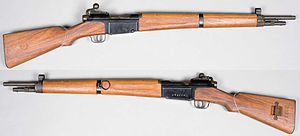MAS-36 rifle
| MAS-36 | |
|---|---|

MAS-36 rifle. From the Swedish Army Museum.
|
|
| Type | Bolt-action rifle |
| Place of origin | France |
| Service history | |
| In service | 1936—1978 |
| Used by | See Users |
| Wars |
World War II Algerian War First Indochina War Suez Crisis Vietnam War Cambodian Civil War Nigerian Civil War Syrian Civil War |
| Production history | |
| Manufacturer | Manufacture d'Armes de Saint-Étienne |
| Produced | 1937—1952 |
| Specifications | |
| Weight | 3.72 kg (8.2 lb) unloaded |
| Length | 1,020 mm (40.16 in) |
| Barrel length | 575 mm (22.64 in) |
|
|
|
| Cartridge | 7.5×54mm French |
| Action | Bolt action |
| Muzzle velocity | 850 m/s (2,789 ft/s) |
| Effective firing range | 400 m (440 yd) with iron sights |
| Feed system | 5-round stripper clip, internal magazine |
| Sights | Iron sights |
The MAS Modèle 36 is a military bolt-action rifle. First adopted in 1936 by France and intended to replace the Berthier and Lebel series of service rifles, it saw service long past the World War II period. It was manufactured by Manufacture d'Armes de Saint-Étienne (MAS), one of several government-owned arms factories in France. Because production was initiated late in 1937, not enough MAS-36 rifles were available to arm French infantry when the war broke out in September 1939. Mass production finally caught up after World War II and MAS-36 rifles became widely used in service during the First Indochina War, the Algerian War and the Suez Crisis. Altogether, about 1.1 million MAS-36 rifles had been manufactured when production ceased in 1952.
The MAS-36 is a short, carbine-style rifle with a two-piece stock and slab-sided receiver. It is chambered for the modern, rimless 7.5×54mm French cartridge, a shortened version of the 7.5×57mm MAS mod. 1924 cartridge that had been introduced in 1924 (then modified in 1929), for France's FM 24/29 light machine gun. The rifle was developed based on French experience in World War I and combines various features of other rifles used, like the British SMLE rifle (rear locking lugs resistant to dirt), British P14/U.S. M1917 Enfield rifle (turned down bolt handle, peep sight), and the German Gewehr 98 (five-round box-magazine), to produce an "ugly, roughly made, but immensely strong and reliable" service rifle.
The MAS-36 bolt handle was bent forward in an "awkward fashion" to bring it into a convenient position for the soldier's hand, some of which found today have since been bent backwards into a facing-downwards position like that of many other bolt-action rifles. The MAS-36 had a relatively short barrel and was fitted with large aperture (rear) and post (front) sights designed for typical combat ranges. Typical for French rifles of the period, the MAS-36 had no manual safety.
...
Wikipedia
